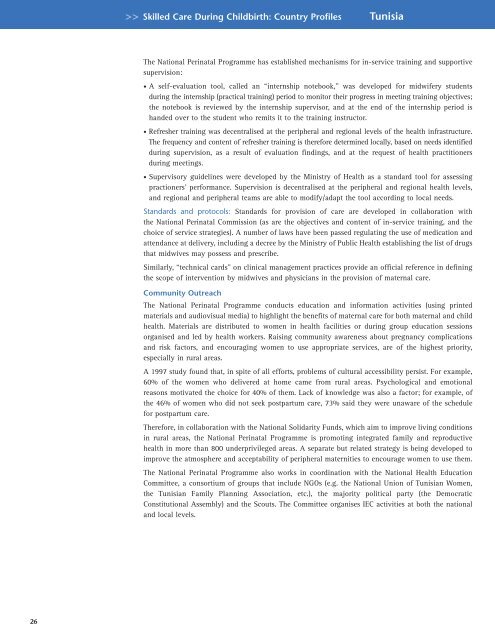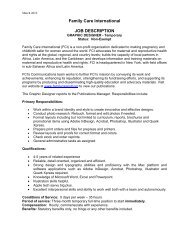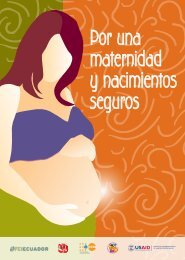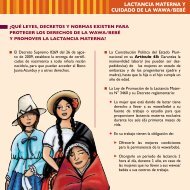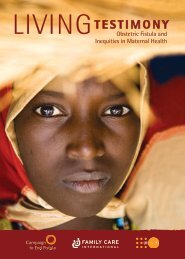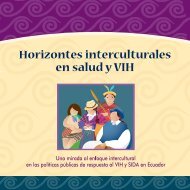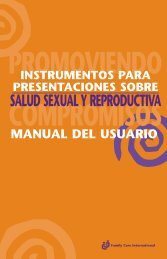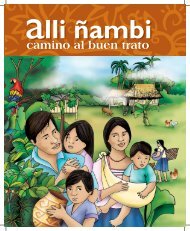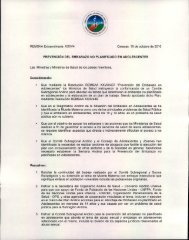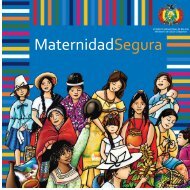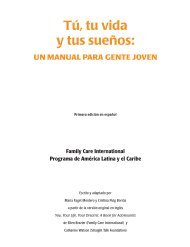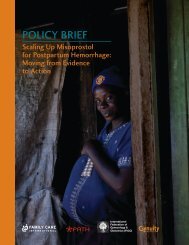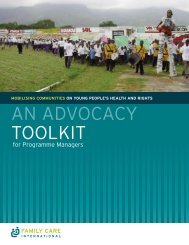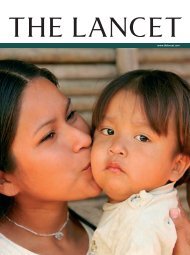SKILLED CARE DURING CHILDBIRTH - Family Care International
SKILLED CARE DURING CHILDBIRTH - Family Care International
SKILLED CARE DURING CHILDBIRTH - Family Care International
You also want an ePaper? Increase the reach of your titles
YUMPU automatically turns print PDFs into web optimized ePapers that Google loves.
Skilled <strong>Care</strong> During Childbirth: Country Profiles Tunisia<br />
The National Perinatal Programme has established mechanisms for in-service training and supportive<br />
supervision:<br />
• A self-evaluation tool, called an “internship notebook,” was developed for midwifery students<br />
during the internship (practical training) period to monitor their progress in meeting training objectives;<br />
the notebook is reviewed by the internship supervisor, and at the end of the internship period is<br />
handed over to the student who remits it to the training instructor.<br />
• Refresher training was decentralised at the peripheral and regional levels of the health infrastructure.<br />
The frequency and content of refresher training is therefore determined locally, based on needs identified<br />
during supervision, as a result of evaluation findings, and at the request of health practitioners<br />
during meetings.<br />
• Supervisory guidelines were developed by the Ministry of Health as a standard tool for assessing<br />
practioners’ performance. Supervision is decentralised at the peripheral and regional health levels,<br />
and regional and peripheral teams are able to modify/adapt the tool according to local needs.<br />
Standards and protocols: Standards for provision of care are developed in collaboration with<br />
the National Perinatal Commission (as are the objectives and content of in-service training, and the<br />
choice of service strategies). A number of laws have been passed regulating the use of medication and<br />
attendance at delivery, including a decree by the Ministry of Public Health establishing the list of drugs<br />
that midwives may possess and prescribe.<br />
Similarly, “technical cards” on clinical management practices provide an official reference in defining<br />
the scope of intervention by midwives and physicians in the provision of maternal care.<br />
Community Outreach<br />
The National Perinatal Programme conducts education and information activities (using printed<br />
materials and audiovisual media) to highlight the benefits of maternal care for both maternal and child<br />
health. Materials are distributed to women in health facilities or during group education sessions<br />
organised and led by health workers. Raising community awareness about pregnancy complications<br />
and risk factors, and encouraging women to use appropriate services, are of the highest priority,<br />
especially in rural areas.<br />
A 1997 study found that, in spite of all efforts, problems of cultural accessibility persist. For example,<br />
60% of the women who delivered at home came from rural areas. Psychological and emotional<br />
reasons motivated the choice for 40% of them. Lack of knowledge was also a factor; for example, of<br />
the 46% of women who did not seek postpartum care, 73% said they were unaware of the schedule<br />
for postpartum care.<br />
Therefore, in collaboration with the National Solidarity Funds, which aim to improve living conditions<br />
in rural areas, the National Perinatal Programme is promoting integrated family and reproductive<br />
health in more than 800 underprivileged areas. A separate but related strategy is being developed to<br />
improve the atmosphere and acceptability of peripheral maternities to encourage women to use them.<br />
The National Perinatal Programme also works in coordination with the National Health Education<br />
Committee, a consortium of groups that include NGOs (e.g. the National Union of Tunisian Women,<br />
the Tunisian <strong>Family</strong> Planning Association, etc.), the majority political party (the Democratic<br />
Constitutional Assembly) and the Scouts. The Committee organises IEC activities at both the national<br />
and local levels.<br />
26


